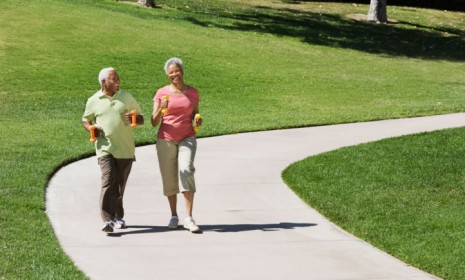Is exercise better for your brain than crossword puzzles?
Going for a walk could be the key to staying sharp well into old age

A free daily email with the biggest news stories of the day – and the best features from TheWeek.com
You are now subscribed
Your newsletter sign-up was successful
The question: A relatively large new study published in the journal Neurology takes a look at mild physical exercise's relationship with mental health for the elderly, posing the question: Is going for a brisk walk better for your brain than, say, completing a crossword puzzle?
How it was tested: Nearly 700 people born in 1936 were enlisted for this study, conducted at the University of Edinburgh in Scotland. In 1947, nearly all of them had been given mandatory intelligence and mental health tests in school. That gave researchers a baseline to work with, and decades later, researchers administered MRI scans to the participants at age 70 to document their brain size. For the next three years, participants tracked both daily leisure activities (playing chess, completing crossword puzzles) and daily physical activities (doing chores, going for walks). At age 73, MRI scans were taken again to measure brain shrinkage.
The outcome: There was a "strong and direct correlation revealing that as physical exercise increases, brain shrinkage decreases," says Christopher Wanjek at LiveScience. Better yet: The exercise "did not have to be strenuous," says Michelle Roberts at BBC News. "Going for a walk several times a week sufficed."
The Week
Escape your echo chamber. Get the facts behind the news, plus analysis from multiple perspectives.

Sign up for The Week's Free Newsletters
From our morning news briefing to a weekly Good News Newsletter, get the best of The Week delivered directly to your inbox.
From our morning news briefing to a weekly Good News Newsletter, get the best of The Week delivered directly to your inbox.
What the experts say: "We are coming to appreciate the fact that people who remain physically active are less likely to show cognitive decline," says Stephen Rao, the director of the Cleveland Clinic Schey Center for Cognitive Neuroimaging, which wasn't involved in the study. And keep in mind, says lead author Alan J. Gow, that "our study showed no real benefit to participating in mentally and socially stimulating activities on brain size, as seen on MRI scans, over the three-year time frame."
The lesson: Lace up your walking shoes! But bear in mind, too, that both physical and non-physical activities have many benefits, like fighting chronic diseases and fighting off depression and fatigue, says LiveScience's Wanjek. Really, "there's no harm to pursuing both at any age."
A free daily email with the biggest news stories of the day – and the best features from TheWeek.com
-
 A dreamy long weekend on the Amalfi Coast
A dreamy long weekend on the Amalfi CoastThe Week Recommends History, pasta, scenic views – this sun-drenched stretch of Italy’s southern coast has it all
-
 Can foster care overhaul stop ‘exodus’ of carers?
Can foster care overhaul stop ‘exodus’ of carers?Today’s Big Question Government announces plans to modernise ‘broken’ system and recruit more carers, but fostering remains unevenly paid and highly stressful
-
 6 exquisite homes with vast acreage
6 exquisite homes with vast acreageFeature Featuring an off-the-grid contemporary home in New Mexico and lakefront farmhouse in Massachusetts